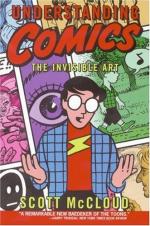
|
| Name: _________________________ | Period: ___________________ |
This test consists of 15 multiple choice questions and 5 short answer questions.
Multiple Choice Questions
1. The standard ______ color process was introduced to help control color costs and streamline the process.
(a) Four
(b) Five
(c) Three
(d) Nine
2. Pictures and words should have what kind of relationship?
(a) Domineering
(b) Subversive
(c) Partnership
(d) Unequal
3. What Scottish physicist isolated the three additive primaries?
(a) Sir James Clerk
(b) Alexander Graham Bell
(c) Louis Ducos Du Hauron
(d) Lord Kelvin
4. The order and emphasis of which two steps demonstrates the most dramatic difference?
(a) Form and structure
(b) Idiom and idea/purpose
(c) Form and idea/purpose
(d) Idiom and Form
5. What aspect of comics has been especially sensitive to changes in technology?
(a) Artists
(b) Length
(c) Color
(d) Contents
6. Which of the following is a use of color in comics?
(a) To add depth
(b) All of these
(c) To create a sensation
(d) To express a mood
7. What fruit is used to illustrate the path of creating art?
(a) Peach
(b) Orange
(c) Apple
(d) Banana
8. The pursuit of truth can be seen as the foundation of which of the following?
(a) Philosophy
(b) Science
(c) All of these
(d) Language
9. What step determines whether the art will be a book, a sculpture or a song?
(a) Surface
(b) Structure
(c) Idea/Purpose
(d) Form
10. After impressionism, art experienced a shift away from _______ and toward _______.
(a) meaning; picture plane
(b) picture plane; resemblance
(c) picture plane; meaning
(d) resemblance; meaning
11. Whose work often evoked a world of depravity and morbid decay through dense puddles of ink and fraying linework?
(a) Jules Feiffer
(b) Spiegelman
(c) Kirby
(d) Jose Munoz
12. What step constructs the work by applying skills, practical knowledge, invention, and problem-solving?
(a) Structure
(b) Form
(c) Craft
(d) Idiom
13. Who said, "Art does not reproduce the visible; rather it makes visible?"
(a) Paul Klee
(b) Wassily Kandinsky
(c) Richard Wagner
(d) French poet Baudelaire
14. Which of the following is NOT listed as a flat-color master?
(a) Cole
(b) McCay
(c) Barks
(d) Masereel
15. What is the most common type of combination where words and pictures go hand in hand to convey an idea that neither could convey alone?
(a) Inter-dependent
(b) Parallel
(c) Duo-specific
(d) Additive
Short Answer Questions
1. What kind of combination uses words and pictures on separate courses with no intersection?
2. The masters of flat-color comics are also masters of what?
3. Which of the following is NOT an example of possible primitive art?
4. What combination has both words and pictures that send the same message?
5. The creation of work in any medium will follow a certain path containing how many steps?
|
This section contains 415 words (approx. 2 pages at 300 words per page) |

|




